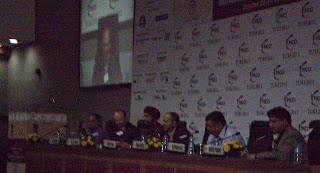-- Sports : Any physical activity that enmeshes competition, includes organized rules and done in a specific area. Usually played for fun or people need exercise to stay fit.
-- Tourism : the commercial organization and operation of holidays and visits to places of interest. (Oxford Dictionary)
-- Sport Tourism : Pertains to travel that engrosses viewing and/or taking part in a sporting meet nesting separated from its common surroundings.
-- Today, Sport Tourism is playing the role of a catalyst in global tourism industry. As far as the global travel industry is concerned, the sector of sport tourism is advancing like a speedball (no pun intended) and equates to six hundred billion dollars, a year.
-- Tourism is a product and over the past decade sport tourism has mutated into an academic field of study. Today, sport and tourism are developed nations' most pursued leisure trip.
-- If we look back in time, then we would see that in Ancient Rome and Greece, people used to travel to distant places to participate in sporting events. So, in the modish scenario, the roots of sport tourism can be traced to the ancient practices, making the concept a better and refined version.
-- A couple of days ago, I wrote about state industry partnership and how it can improve standards of sports in India. Besides, using Sports for socio-economic development, for instance promoting intersections of sport with various industries - e.g. Tourism, can help a lot. With India's wide geographical diversities, a lot of amazing abodes are there for those who love adventure sports and the picture above is an example of such activity.
-- Today, business tours colligated with sporting activities is becoming quite trendy. Sports like Golf are a prime example of such activities. Golf tours organized at different venues, allow the players of this managerial sport, an opportunity to do business deal, which in turn has introduced the concept of corporate golf, but I digress. Yesterday, Formula 1 race was held in India and the eyes of the world were set upon us. There is little doubt in my mind that F1 race wouldn't have resulted in some bulky business deals.
That's all for today. My notion was to briefly acquaint y'all to the concept of sport tourism, but I'll be doing another blog some other time and deliberate over sport tourism in the Indian context.
Your turn Readerland, tell me what you think about tonight's work and write your own suggestions or anything and thanks for reading.
Thought Of The Day : - ''The most beloved of deeds is the one that is continuous, even if it is little.''



































